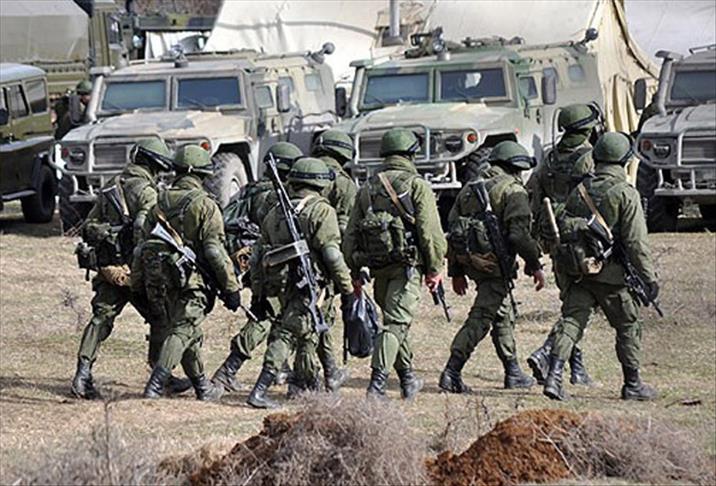
By Handan Kazanci
ISTANBUL
As ISIL maintains its grip on parts of Iraq and Syria despite U.S.-led airstrikes, experts say the return of the militant group’s experienced fighters from the Caucasus region to their hometowns poses a deadly future threat to Russia.
The profile of extremist fighters from the Caucasus is rising. A leader of ISIL attacks in Kobani, a Kurdish city close to the Turkish-Syrian border, is Georgian national Tarkan Batirashvili – known by his nom de guerre Shaykh Abu Omer al-Shishani.
In Chechnya last week, fighting between police officers and suspected militants resulted in 20 deaths in Grozny, the capital of the troubled autonomous Russian republic.
Chechen president Ramzan Kadyrov, 38, claimed he had information showing that the militants were linked to Doku Umarov, the late leader of the self-declared “Caucasus Emirate”, a Muslim extremist organization founded in 2007 to fight against Russian rule.
The Caucasus is a fertile ground for fighters as there have been two large-scale wars – between 1994-96 and 1999-2004 – involving Moscow, followed by lower-level insurgencies ever since.
Chechen militants’ fight against Russia started as a nationalist movement but has largely morphed into radical religious extremism.
According to an October report by the Soufan Group, a New York-based security intelligence organization, Caucasus fighters form a small but influential bloc among the 15,000-strong ISIL forces. According to the report, 800 fighters are from Russia – with most of these coming from the Caucasus.
However, recent media reports have cited reviewed CIA figures which put the number of ISIL fighters up to anywhere between 20,000 and 31,000 – much higher than the agency’s earlier estimates.
Russia itself has already experienced homegrown terrorist attacks. Forty Chechen militants took around 1,000 people hostage in a Moscow theater in 2002. Around 130 hostages died after Russian security forces stormed the building.
According to John Russell an emeritus professor of Russian and Security Studies from the U.K.’s University of Bradford, Caucasus fighters’ role in ISIL is as battle-trained militants, some with up to 20 years’ experience of fighting Russians, pro-Russian local leaders and, in some cases, fighting in Bosnia, Georgia, Afghanistan, Ukraine and the Middle East.
“It is effectively illegal to advocate separation or independence for the North Caucasus, so most of those who oppose what they perceive as Russian ‘colonial’ domination conclude that they have only one active outlet – to join the jihadists,” Russell adds.
British journalist and writer Thomas De Waal says: “Clearly they see more opportunities in Syria and Iraq than they do at home.”
“They are rather restricted in what they do in the Caucasus. Russia is fairly strongly controlling the north Caucasus. If you want to fight jihad than it is better to go to Syria and Iraq,” added de Waal who works for the Washington-based Carnegie Endowment for International Peace think tank.
“There are fighters from all over the world in ISIL but there are quite a lot of Chechens, Dagestanis and Azerbaijanis plus some Muslims from Georgia,” he adds.
Russell, who is also the author of “Chechnya – Russia’s War on Terror,” says: “The fighters from the Caucasus are so powerful in Salafi organizations like ISIL both because there is no scope for the expression of radical Islamic views in their home region and the mountain tribes have a long record of resistance to more powerful invaders.”
It is the avowed aim of the Caucasian Emirate to establish a Sharia-governed state in the North Caucasus, according to Russell.
“With the exception of Chechnya, which has received massive subsides from Moscow and has experienced, under Ramzan Kadyrov, something of a social, cultural and economic renaissance, the region remains one of the poorest in Russia and thus remains a potential tinderbox until these questions are addressed,” Russell said.
The U.K. academic says that the authorities in Chechnya, where most of the Caucasian fighters originate, have cracked down extremely hard on anyone suspected of radicalism.
“A more moderate form of Sufism, banned under the Soviets, has flourished there.
“However, given the large-scale emigration of North Caucasians and other Muslim minorities to all the large industrial cities in Russia, the potential for violence from this source is extremely high,” he added.
“At the moment the traffic seems to (to be going) from Caucasia to the Middle East. One day they will try to go home but Russian or Azerbaijani authorities will try to stop them,” de Waal says.
Anadolu Agency website contains only a portion of the news stories offered to subscribers in the AA News Broadcasting System (HAS), and in summarized form. Please contact us for subscription options.








